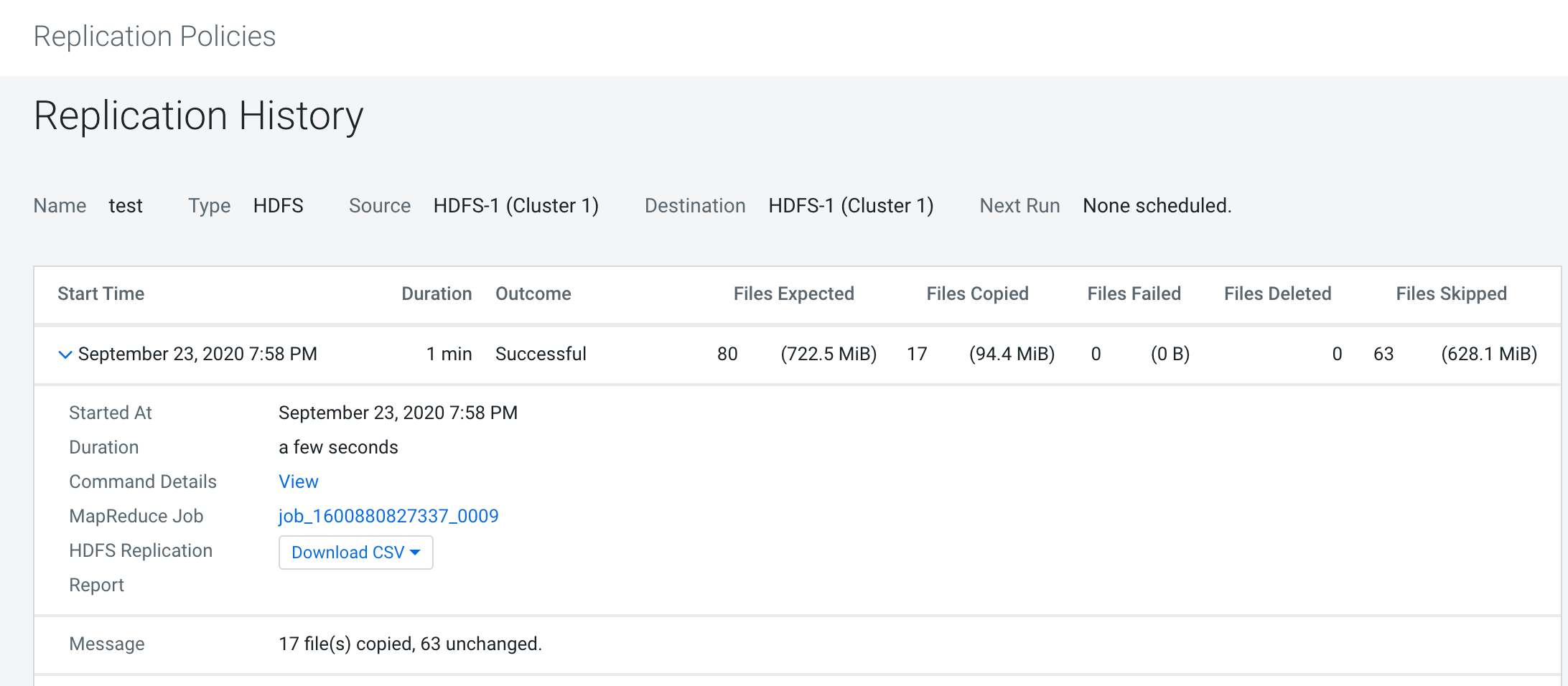| Start Time |
Shows the details about the job. You can expand the section to view the
following job details:
- Started At - Displays the time the replication job started.
- Duration - Displays the time duration for the job to complete.
- Command Details - Displays the command details in a new tab after you click
View.
The Command Details page displays the details and
messages about each step during command run. On this page, click
Context to view the service status page relevant to the
command, and click Download to download the summary as a
JSON file. To view the command details, expand the Step section and then choose
Show All Steps, Show Only Failed Steps, or Show Only Running Steps. In this section,
you can perform the following tasks:
- View the actual command string.
- View the start time and duration for the command run.
- View the host status page for the command by clicking the host link.
- View the full log file for the command by selecting the stdout or stderr
tab.
- MapReduce Job. Click the link to view the job details.
- HDS Replication Report. Click Download CSV to view the
following options:
- Listing - Click to download the CSV file that
contains the replication report. The file lists the list of files and
directories copied during the replication job.
- Status - Click to download the CSV file that
contains the complete status report. The file contains the full status
report of the files where the status of the replication is one of the
following:
- ERROR – An error occurred and the file was not
copied.
- DELETED – A deleted file.
- SKIPPED – A file where the replication was
skipped because it was up-to-date.
- Error Status Only - Click to download the CSV file
that contains the status report of all copied files with errors. The file
lists the status, path, and message for the copied files with errors.
- Deleted Status Only - Click to download the CSV
file that contains the status report of all deleted files. The file lists
the status, path, and message for the databases and tables that were
deleted.
- Skipped Status Only - Click to download the CSV
file that contains the status report of all skipped files. The file lists
the status, path, and message for the databases and tables that were
skipped.
- Performance - Click to download a CSV file which
contains a summary report about the performance of the running replication
job. The performance summary report includes the last performance sample for
each mapper that is working on the replication job.
- Full Performance - Click to download the CSV file
that contains the performance report of the job. The performance report
shows the samples taken for all the mappers during the full execution of the
replication job.
- (Dry Run only) View the number of Replicable Files. Displays the number
of files that would be replicated during an actual replication.
- (Dry Run only) View the number of Replicable Bytes. Displays the number
of bytes that would be replicated during an actual replication.
- View the number of Impala UDFs replicated. (Displays only for Hive/Impala
replications where Replicate Impala Metadata is selected.)
- If a user was specified in the Run As Username field when creating the
replication job, the selected user displays.
- View messages returned from the replication job.
|
| Duration |
Amount of time the replication job took to
complete. |
| Outcome |
Indicates the status of the replication job as Successful or Failed. |
| Files Expected |
Number of files expected to be copied and its file size based on the
parameters of the replication policy. |
| Files Copied |
Number of files copied and its file size for the replication job. |
| Files Failed |
Number of files that failed to be copied and its file size for the
replication job. |
| Files Deleted |
Number of files that were deleted and its file size for the replication
job. |
| Files Skipped |
Number of files skipped and its file size for the replication job. The
replication process skips files that already exist in the destination and have not
changed. |

